Bed Bug Prevention at the University of Florida
Kevyn Juneau, IPM Florida
During the past few years, bed bug infestations have increased at an alarming rate in motels, hotels, and homes in the U.S. and around the world. There also have been bed bug infestations in UF residence facilities. This information is provided to help you keep bed bugs out of your home.
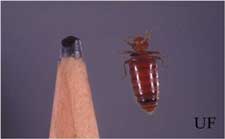
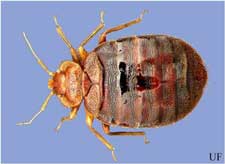
Adult bed bugs are oval, flat, and about 3/16 inch (4-5 mm) long. They are insects with piercing-sucking mouthparts, so they bite and suck blood like a mosquito. These insects hide during the day in bedding, mattresses, behind baseboards, and other furnishings. Bed bugs most often feed on people at night while the victims are asleep in their beds. Bed bugs normally bite the upper body where skin is exposed. Bed bugs do not transmit disease, but their bites leave small white to red welts that itch intensely. If you find you have bed bugs in your apartment, you will not eliminate the problem without UF's professional help. The UF Department of Housing and Residence Education provides free pest control.
Used furniture: Bed bugs are often spread through used 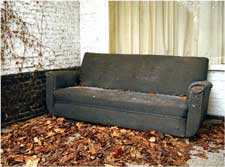 furniture. It is best to buy new furniture, but if you acquire used furniture, such as a bed or couch, carefully inspect it before bringing it into the apartment. Check the seams and stitching for bed bugs or blood spots. If you find bed bugs on furniture, do not purchase it! If you discover bed bugs after you bring the furniture home, immediately contact the UF Housing and Residence Education pest control professionals by filling out a work order or through the Housing Automated Work-request Kiosk (H.A.W.K): www.housing.ufl.edu.
furniture. It is best to buy new furniture, but if you acquire used furniture, such as a bed or couch, carefully inspect it before bringing it into the apartment. Check the seams and stitching for bed bugs or blood spots. If you find bed bugs on furniture, do not purchase it! If you discover bed bugs after you bring the furniture home, immediately contact the UF Housing and Residence Education pest control professionals by filling out a work order or through the Housing Automated Work-request Kiosk (H.A.W.K): www.housing.ufl.edu.
Hotels and motels: The cleanliness of a motel or hotel is not always a true indication 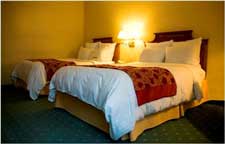 of whether there might be a bed bug problem.Aguest who stayed in the room before you may have left some of these pests. Bed bugs are spread in luggage and clothing from a motel or hotel to other locations, such as your home in the UF residence facilities.
of whether there might be a bed bug problem.Aguest who stayed in the room before you may have left some of these pests. Bed bugs are spread in luggage and clothing from a motel or hotel to other locations, such as your home in the UF residence facilities.
To avoid bringing bed bugs back with you from travel: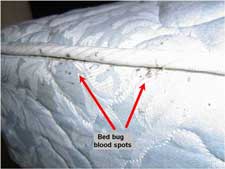
- Never place your luggage on or next to the beds.
- Before you settle into the hotel room inspect the bed and furniture. Check behind the headboard. This is the best place to look for bed bugs because it is where they are not disturbed, yet still close to their food source.
- Take the sheet, pull it back, and look at the folds and seams of the mattress. Check the mattress for blood spots about the size of a pencil point.
- When packing to leave, check your clothing and luggage for signs of the small insects. Check seams and folds carefully.
- If you are bitten while staying in a motel or hotel room, look very carefully around the mattress and bed to try to determine if bed bugs or another biting insect, such as a mosquito, caused it. If you discover bed bugs, report the situation immediately to motel/hotel staff.
- You can kill bed bugs with heat in excess of 113○F (45○C). If you discover bed bugs in your clothing or linen, wash the items in hot water and dry them in a clothes dryer.
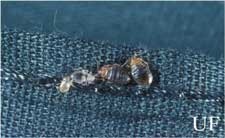
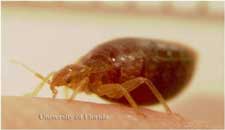
If you take care to inspect the areas where you stay and check your luggage before coming home to the residence facility, you will significantly reduce the chances of a bed bug infestation.
If you discover bed bugs in your apartment, immediately contact the UF Housing and Residence Education pest control professionals by filling out a work order or sending a H.A.W.K. request. www.housing.ufl.edu.


